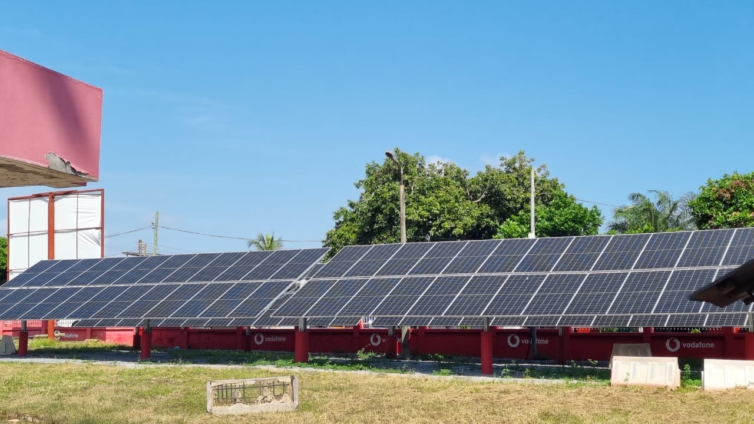
Vodafone Ghana, a leader in Ghana’s telecommunications industry, is at the front of the charge for a green energy revolution in Africa.
In line with Vodafone Group, the business is taking significant steps to reduce its impact on the planet by reducing our greenhouse gas emissions by 50% by 2025 and becoming net zero by 2040.
To set the ball rolling, the company is starting with the solarization of two telephone exchanges in Accra – Dansoman and Achimota. A telephone exchange is an important but energy-hungry part of the communications network, responsible for connecting people by constantly processing large amounts of voice and data.
25,622.1KWh of solar power was generated to run Vodafone’s Dansoman exchange in 2022. This is equivalent to ~11,839kg of CO2 reduced from the environment. While this may seem a modest amount in comparison to the ~400 million tons of carbon dioxide released into the atmosphere yearly because of human activity worldwide, takes each individual cumulative effect to make the substantial difference necessary.
Prior to the completion of the Achimota exchange solarisation project in 2022, Vodafone Ghana’s engineers are working to reduce energy consumption through obsolete equipment replacement with more energy-efficient ones. This was made possible through advancements in solar technology and recent upgrades to key components.
Through these solarisation projects, Vodafone Ghana aspires to take full control of its electricity requirements and manage them more efficiently and at substantially lower costs. Vodafone has engaged the relevant energy authorities on the possibility of feeding the excess energy produced by the Vodafone Ghana solarisation projects into the national grid to bolster its output to the nation.
As Sustainability Manager at Vodafone Ghana, Jacqueline Makumator-Jones shared in an interview, “…it is important that our business success does not come at the cost of the planet. We have committed to halving our environmental impact and reducing our carbon emissions by 2040. At Vodafone Ghana, we are taking major steps to green our energy consumption which accounts for a large percentage of the carbon footprint of our core operations.”
In the last decade, significant advancements have been made in the development of cheaper and more efficient solar and other green technologies. Nevertheless, businesses and governments remain hesitant to implement these technologies, citing cost as a key factor – a finding which was confirmed at the 2022 World Economic Forum in Davos.
Other factors found to be limiting the implementation of green technologies at both the macro and micro levels include a lack of will and a general ‘sluggish’ attitude towards green change. Experts and environmental activists from several countries have called for businesses and governments to finance the global transition to a greener future at a faster pace than they had been doing.
Vodafone Group is taking significant steps to reduce its impact on the planet, in line with which it has made commitments towards going 100% green. These include reducing greenhouse gas emissions by 50% by 2025, becoming net zero by 2040, and purchasing 100% of its electricity from renewable sources by 2025. As part of its social contract, Vodafone Ghana is also committed to ensuring compliance with all environmental requirements.
Speaking on the solarisation efforts, Chief Executive Office of Vodafone Ghana, Patricia Obo-Nai stated that, ‘At Vodafone Ghana, our brand of corporate responsibility prioritises activities and actions that reduce the environmental impact on business and the communities in which we serve.
The solarisation of our exchanges is a testament to our efforts in putting into action our green energy agenda to curb carbon emissions towards reducing the negative effects of climate change on our people and environment and reduce our dependence on the national grid. At Vodafone, we believe in advocating and practising greater responsibility that has a positive impact on the wider society.”

